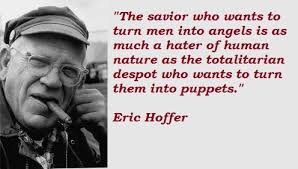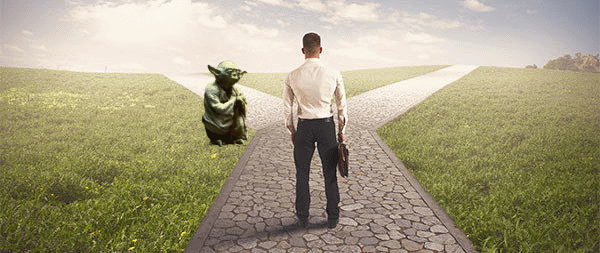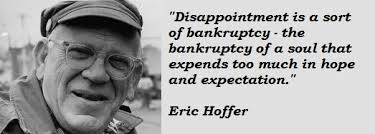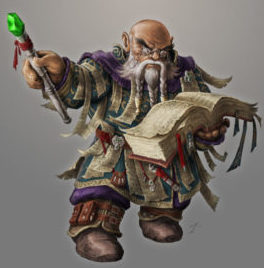The following is a short sample of the many aphorisms that can be found in Eric Hoffer’s books. Because he believed in the virtue of brevity in the art of writing, nearly every sentence he wrote can stand alone as an individual idea, complete in itself.
“It is not at all simple to understand the simple.”
“We all have private ails. The troublemakers are they who need public cures for their private ails.”
“Our quarrel with the world is an echo of the endless quarrel proceeding within us.”
“Spiritual stagnation ensues when man’s environment becomes unpredictable or when his inner life is made wholly predictable.”
“Whoever originated the cliché that money is the root of all evil knew hardly anything about the nature of evil and very little about human beings.”
“The monstrous evils of the twentieth century have shown us that the greediest money grubbers are gentle doves compared with money-hating wolves like Lenin, Stalin, and Hitler, who in less than three decades killed or maimed nearly a hundred million men, women, and children and brought untold suffering to a large portion of mankind.”
“Every era has a currency that buys souls. In some the currency is pride, in others it is hope, in still others it is a holy cause. There are of course times when hard cash will buy souls, and the remarkable thing is that such times are marked by civility, tolerance, and the smooth working of everyday life.”
“When grubbing for necessities man is still an animal. He becomes uniquely human when he reaches out for the superfluous and extravagant.”
“A society that refuses to strive for superfluities is likely to end up lacking in necessities.”
“Man is a luxury loving animal. Take away play, fancies, and luxuries, and you will turn man into a dull, sluggish creature, barely energetic enough to obtain a bare subsistence. A society becomes stagnant when its people are too rational or too serious to be tempted by baubles.”
“There is no reason why humanity cannot be served equally by weighty and trivial motives.”
“It is loneliness that makes the loudest noise. This is true of men as of dogs.”
“We clamor for equality chiefly in matters in which we ourselves cannot hope to attain excellence. To discover what a man truly craves but knows he cannot have we must find the field in which he advocates absolute equality. By this test Communists are frustrated Capitalists.”
“We have rudiments of reverence for the human body, but we consider as nothing the rape of the human mind.”
“People who bite the hand that feeds them usually lick the boot that kicks them.”
“What are we when we are alone? Some, when they are alone, cease to exist.”
“The awareness of their individual blemishes and shortcomings inclines the frustrated to detect ill will and meanness in their fellow men. Self-contempt, however vague, sharpens our eyes for the imperfections of others. We usually strive to reveal in others the blemishes we hide in ourselves.”
“The capacity for getting along with our neighbor depends to a large extent on the capacity for getting along with ourselves. The self-respecting individual will try to be as tolerant of his neighbor’s shortcomings as he is of his own.”
“The role the unfit play in human affairs should make us pause whenever we are prompted to see man as a mere animal and not a being of an order apart.”
“A war is not won if the defeated enemy has not been turned into a friend.”
“Lack of sensitivity is perhaps basically an unawareness of ourselves.”
“In every passionate pursuit, the pursuit counts more than the object pursued.”
“The central task of education is to implant a will and facility for learning; it should produce not learned but learning people. The truly human society is a learning society, where grandparents, parents, and children are students together.”
“Every extreme attitude is a flight from the self.”
“The uncompromising attitude is more indicative of an inner uncertainty than of deep conviction. The implacable stand is directed more against the doubt within than the assailant without.”
“To most of us nothing is so invisible as an unpleasant truth. Though it is held before our eyes, pushed under our noses, rammed down our throats- we know it not.”
“It is a perplexing and unpleasant truth that when men already have “something worth fighting for,” they do not feel like fighting.”
“It is not actual suffering but a taste of better things which excites people to revolt.”
“Our frustration is greater when we have much and want more than when we have nothing and want some. We are less dissatisfied when we lack many things than when we seem to lack but one thing.”
“Both the revolutionary and the creative individual are perpetual juveniles. The revolutionary does not grow up because he cannot grow, while the creative individual cannot grow up because he keeps growing.”
“The technique of a mass movement aims to infect people with a malady and then offer the movement as a cure.”
“Propaganda does not deceive people; it merely helps them to deceive themselves.”
“The taint inherent in absolute power is not its inhumanity but its antihumanity.”
“The only index by which to judge a government or a way of life is by the quality of the people it acts upon. No matter how noble the objectives of a government, if it blurs decency and kindness, cheapens human life, and breeds ill will and suspicion- it is an evil government.”
“Absolute power corrupts even when exercised for humane purposes. The benevolent despot who sees himself as a shepherd of the people still demands from others the submissiveness of sheep.”
“Freedom means freedom from forces and circumstances which would turn man into a thing, which would impose on man the passivity and predictability of matter. By this test, absolute power is the manifestation most inimical to human uniqueness. Absolute power wants to turn people into malleable clay.”
“The aspiration toward freedom is the most essentially human of all human manifestations.”
“To some, freedom means the opportunity to do what they want to do; to most it means not to do what they do not want to do. It is perhaps true that those who can grow will feel free under any condition.”
“We cannot hate those who we despise.”
“The fanatic is not really a stickler to principle. He embraces a cause not primarily because of its justness or holiness but because of his desperate need for something to hold onto.”
“The devil personifies not the nature that is around us but the nature that is within us- the infinitely ferocious and cunning prehuman creature that is still within us, sealed in the subconscious cellars of the psyche.”
“We run fastest and farthest when we run from ourselves.”
“How much easier is self-sacrifice than self-realization.”
“An empty head is not really empty; it is stuffed with rubbish. Hence the difficulty of forcing anything in to an empty head.”
“The less satisfaction we derive from being ourselves, the greater is our desire to be like others.”
“What monstrosities would walk the streets were some people’s faces as unfinished as their minds.”
“Only the individual who has come to terms with his self can have a dispassionate attitude toward the world.”
“Language was invented to ask questions. Answers may be given by grunts and gestures, but questions must be spoken. Humanness came of age when man asked the first question. Social stagnation results not from a lack of answers but from the absence of the impulse to ask questions.”
“The ability to get along without an exceptional leader is the mark of social vigor.”
“A man by himself is in bad company.”
“The compulsion to take ourselves seriously is in inverse proportion to our creative capacity. When the creative flow dries up, all we have left is our importance.”
“Self-righteousness is a loud din raised to drown the voice of guilt within us.”
“You accept certain unlovely things about yourself and manage to live with them. The atonement for such an acceptance is that you make allowances for others – that you cleanse yourself of the sin of self-righteousness.”
“The end comes when we no longer talk with ourselves. It is the end of genuine thinking and the beginning of the final loneliness.”
“When we leave people on their own, we are delivering them into the hands of a ruthless taskmaster from whose bondage there is no escape. The individual who has to justify his existence by his own efforts is in eternal bondage to himself.”
“To be fully alive is to feel that everything is possible.”



